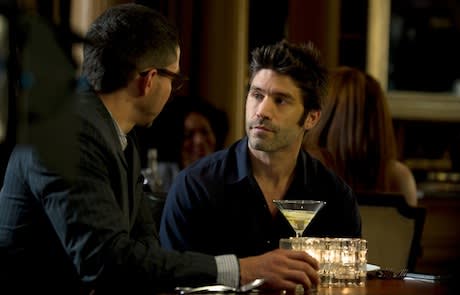Glenn Gaylord's marriage rights drama does a good job of balancing a relatable human story with the issue of legal equality. Rather than weight down the narrative with a crusading attitude, Gaylord organically integrates his gripes about national policy on same sex marriage into the series of options a gay Englishman explores while trying to figure out how to stay in America.
David W. Ross plays Jack Edwards, the "gay uncle" of young Tara Edwards. Out of a sense of guilt, Jack has hung around to help his sister-in-law, Mya (Alicia Witt), raise his niece; he blames himself for the accidental death of his brother, Peter.
With his immigration status revoked, Jack marries his best friend, "gold star lesbian" Ali Federman (Jamie-Lynn Sigler, best known as Meadow Soprano), in order to stay in the country with the only family he has left. All of his friends are very understanding; nobody who knows the duo has any illusion about what kind of marriage it is and nobody admonishes him for doing something illegal.
Everything would be hunky dory, and we wouldn't have much of a film, if it weren't for the appearance of Mano Alfaro (Maurice Compte), a smart, handsome and charming Spaniard. Jack is instantly smitten and in pursuing his burgeoning love with Mano, he neglects his responsibilities as a husband and partner in crime with Ali.
The politics of it all come into play when the question of why he doesn't just marry Mano to stay in the country instead is raised. While the drama is rather relentless and seldom less than completely earnest, Ross, who also wrote the script, has enough natural charisma to carry the picture through its stickier moments and his co-stars all turn in solid performances.
Gaylord favours a simple and efficient shooting style that lets the story speak for itself. The film isn't enhanced by the lack of stylistic fingerprints, nor is it made unduly sappy by the same technique. For all the rallying against normalcy it does, I Do is about family and making tough choices for love first and foremost – topics that anyone can appreciate, regardless of sexual orientation.
It's just a bonus that the film casually exposes the ridiculous hypocrisy of American national policy on the validity of marriage types.
(School Pictures)David W. Ross plays Jack Edwards, the "gay uncle" of young Tara Edwards. Out of a sense of guilt, Jack has hung around to help his sister-in-law, Mya (Alicia Witt), raise his niece; he blames himself for the accidental death of his brother, Peter.
With his immigration status revoked, Jack marries his best friend, "gold star lesbian" Ali Federman (Jamie-Lynn Sigler, best known as Meadow Soprano), in order to stay in the country with the only family he has left. All of his friends are very understanding; nobody who knows the duo has any illusion about what kind of marriage it is and nobody admonishes him for doing something illegal.
Everything would be hunky dory, and we wouldn't have much of a film, if it weren't for the appearance of Mano Alfaro (Maurice Compte), a smart, handsome and charming Spaniard. Jack is instantly smitten and in pursuing his burgeoning love with Mano, he neglects his responsibilities as a husband and partner in crime with Ali.
The politics of it all come into play when the question of why he doesn't just marry Mano to stay in the country instead is raised. While the drama is rather relentless and seldom less than completely earnest, Ross, who also wrote the script, has enough natural charisma to carry the picture through its stickier moments and his co-stars all turn in solid performances.
Gaylord favours a simple and efficient shooting style that lets the story speak for itself. The film isn't enhanced by the lack of stylistic fingerprints, nor is it made unduly sappy by the same technique. For all the rallying against normalcy it does, I Do is about family and making tough choices for love first and foremost – topics that anyone can appreciate, regardless of sexual orientation.
It's just a bonus that the film casually exposes the ridiculous hypocrisy of American national policy on the validity of marriage types.
